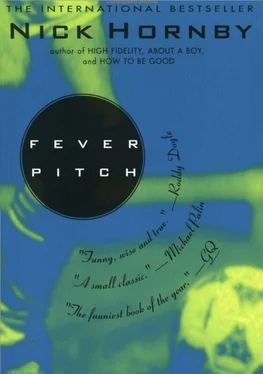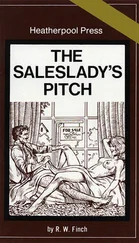I’d like to thank Liz Knights for her tremendous support, encouragement and enthusiasm; Virginia Bovell for her tolerance and understanding; Nick Coleman, Ian Craig, Ian Preece, Caroline Dawnay and Viv Redman.
For my mother, and for my father
SUNDAY, 14TH JULY 1991
It’s in there all the time, looking for a way out.
I wake up around ten, make two cups of tea, take them into the bedroom, place one on each side of the bed. We both sip thoughtfully; so soon after waking there are long, dream-filled gaps between the occasional remark—about the rain outside, about last night, about smoking in the bedroom when I have agreed not to. She asks what I’m doing this week, and I think: (1) I’m seeing Matthew on Wednesday. (2) Matthew’s still got my Champions video. (3) [1] Remembering that Matthew, a purely nominal Arsenal fan, has not been to Highbury for a couple of years, and so has had no opportunity to watch the more recent recruits in the flesh
I wonder what he thought of Anders Limpar.
And in three easy stages, within fifteen, twenty minutes of waking, I’m on my way. I see Limpar running at Gillespie, swaying to his right, going down: PENALTY! DIXON SCORES! 2-0! … Merson’s back-heel flick and Smith’s right-foot shot into the far corner in the same match … Merson’s little push past Grobbelaar up at Anfield … Davis’s swivel and smash against Villa … (And this, remember, is a morning in July, our month off, when there is no club football of any kind.) Sometimes, when I let this dreamy state take me over completely, I go on and back, through Anfield ’89, Wembley ’87, Stamford Bridge ’78, my whole footballing life flashing before my eyes.
“What are you thinking about?” she asks.
At this point I lie. I wasn’t thinking about Martin Amis or Gerard Depardieu or the Labour Party at all. But then, obsessives have no choice; they have to lie on occasions like this. If we told the truth every time, then we would be unable to maintain relationships with anyone from the real world. We would be left to rot with our Arsenal programmes or our collection of original blue-label Stax records or our King Charles spaniels, and our two-minute daydreams would become longer and longer and longer until we lost our jobs and stopped bathing and shaving and eating, and we would lie on the floor in our own filth rewinding the video again and again in an attempt to memorise by heart the whole of the commentary, including David Pleat’s expert analysis, for the night of 26th of May 1989. (You think I had to look the date up? Ha!) The truth is this: for alarmingly large chunks of an average day, I am a moron .
I would not wish to suggest that the contemplation of football is in itself an improper use of the imagination. David Lacey, the chief football correspondent for the Guardian , is a fine writer and an obviously intelligent man, and presumably he must devote even more of his interior life than I do to the game. The difference between Lacey and me is that I rarely think . I remember, I fantasise, I try to visualise every one of Alan Smith’s goals, I tick off the number of First Division grounds I have visited; once or twice, when I have been unable to sleep, I have tried to count every single Arsenal player I have ever seen. (When I was a kid I knew the names of the wives and girlfriends of the Double-winning team; now, I can only remember that Charlie George’s fiancée was called Susan Farge, and that Bob Wilson’s wife was called Megs, but even this partial recall is terrifyingly unnecessary.)
None of this is thought , in the proper sense of the word. There is no analysis, or self-awareness, or mental rigour going on at all, because obsessives are denied any kind of perspective on their own passion. This, in a sense, is what defines an obsessive (and serves to explain why so few of them recognise themselves as such. A fellow fan who last season went to watch Wimbledon reserves against Luton reserves on a freezing January afternoon on his own—not in a spirit of one-upmanship or some kind of self-mocking, laddish wackiness, but because he was genuinely interested— recently strenuously denied to me that he was eccentric in any way).
Fever Pitch is an attempt to gain some kind of an angle on my obsession. Why has the relationship that began as a schoolboy crush endured for nearly a quarter of a century, longer than any other relationship I have made of my own free will? (I love my family dearly, but they were rather foisted on me, and I am no longer in touch with any of the friends I made before I was fourteen—apart from the only other Arsenal fan at school.) And why has this affinity managed to survive my periodic feelings of indifference, sorrow and very real hatred?
The book is also, in part, an exploration of some of the meanings that football seems to contain for many of us. It has become quite clear to me that my devotion says things about my own character and personal history, but the way the game is consumed seems to offer all sorts of information about our society and culture. (I have friends who will regard this as pretentious, self-serving nonsense, the kind of desperate justification one might expect from a man who has spent a huge chunk of his leisure time fretting miserably in the cold. They are particularly resistant to the idea because I tend to overestimate the metaphorical value of football, and therefore introduce it into conversations where it simply does not belong. I now accept that football has no relevance to the Falklands conflict, the Rushdie affair, the Gulf War, childbirth, the ozone layer, the poll tax, etc., etc., and I would like to take this opportunity to apologise to anyone who has had to listen to my pathetically strained analogies.)
Finally, Fever Pitch is about being a fan. I have read books written by people who obviously love football , but that’s a different thing entirely; and I have read books written, for want of a better word, by hooligans, but at least 95 per cent of the millions who watch games every year have never hit anyone in their lives. So this is for the rest of us, and for anyone who has wondered what it might be like to be this way. While the details here are unique to me, I hope that they will strike a chord with anyone who has ever found themselves drifting off, in the middle of a working day or a film or a conversation, towards a left-foot volley into a top right-hand corner ten or fifteen or twenty-five years ago.
ARSENAL v STOKE CITY
14.9.68
I fell in love with football as I was later to fall in love with women: suddenly, inexplicably, uncritically, giving no thought to the pain or disruption it would bring with it.
In May ’68 (a date with connotations, of course, but I am still more likely to think of Jeff Astle than of Paris), just after my eleventh birthday, my father asked me if I’d like to go with him to the FA Cup Final between West Brom and Everton; a colleague had offered him a couple of tickets. I told him that I wasn’t interested in football, not even in the Cup Final—true, as far as I was aware, but perversely I watched the whole match on television anyway. A few weeks later I watched the Man Utd-Benfica game, enthralled, with my mum, and at the end of August I got up early to hear how United had got on in the final of the World Club Championship. I loved Bobby Charlton and George Best (I knew nothing about Denis Law, the third of the Holy Trinity, who had missed the Benfica match through injury) with a passion that had taken me completely by surprise; it lasted three weeks, until my dad took me to Highbury for the first time.
Читать дальше











